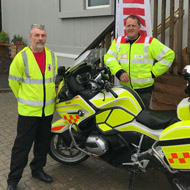
Paul Spellman and Simon Grover provide NHS courier service
Many veterinary professionals give up their free time to help sick and injured animals. But on top of long, demanding hours not many find time to offer their services to the human health profession.
BSAVA members Paul Spellman and Simon Grover regularly volunteer their time as ‘Blood Bikers' - advanced motorcyclists that deliver a free out-of-hours courier service to NHS hospitals and trusts.
Vet locum Paul became a blood biker with Bloodrun following complications with his own health in 2014. On a recent visit to BSAVA headquarters, he shared stories with membership services manager Simon, who volunteers with Severn Freewheelers.
“My interest in Blood Bikers was sparked by my own health problems in 2014, and out of massive respect and gratitude for the NHS which is so special, along with a friend already being involved who told me they were short of volunteers,” said Paul.
“There is a feeling at 3 am in a hospital, doing something to help, that is hard to describe. But it is also about riding a motorbike which is an adjunct to my hobby - if you ride one you will understand.”
Simon Grover is responsible for supporting volunteers at BSAVA and said that he jumped at the opportunity to ride again after having children.
“I’ve enjoyed motorcycles ever since I was 17, so I thought Blood Bikers might give me a chance to get back on a bike, and following a chance meeting I was being trained as an Advanced rider,” he said.
“It is great to give something back to the community, I’ve only done four shifts and already I’ve clocked up 2,600 miles with more than 70 calls received – you know you’re making a difference because the nurses tell you that they and the patients are so grateful, and although the allotment, exercise regime and sleep patterns have suffered, I wouldn’t change it.”
Registered charity Severn Freewheelers is funded through voluntary donations and costs around £50,000 a year to run, yet saves the NHS around £250,000 a year. Its main aim is to help patients by transporting human tissue and other essential medical items between hospitals and blood transfusion banks in Gloucestershire and the surrounding areas.
If you would like to make a donation to either organisation, please contact the BSAVA on 01452 726700 or email administration@bsava.com
Image (C) BSAVA



 The veterinary mental health charity Vetlife is inviting the veterinary community to join it for a sponsored cold-water dip.
The veterinary mental health charity Vetlife is inviting the veterinary community to join it for a sponsored cold-water dip.